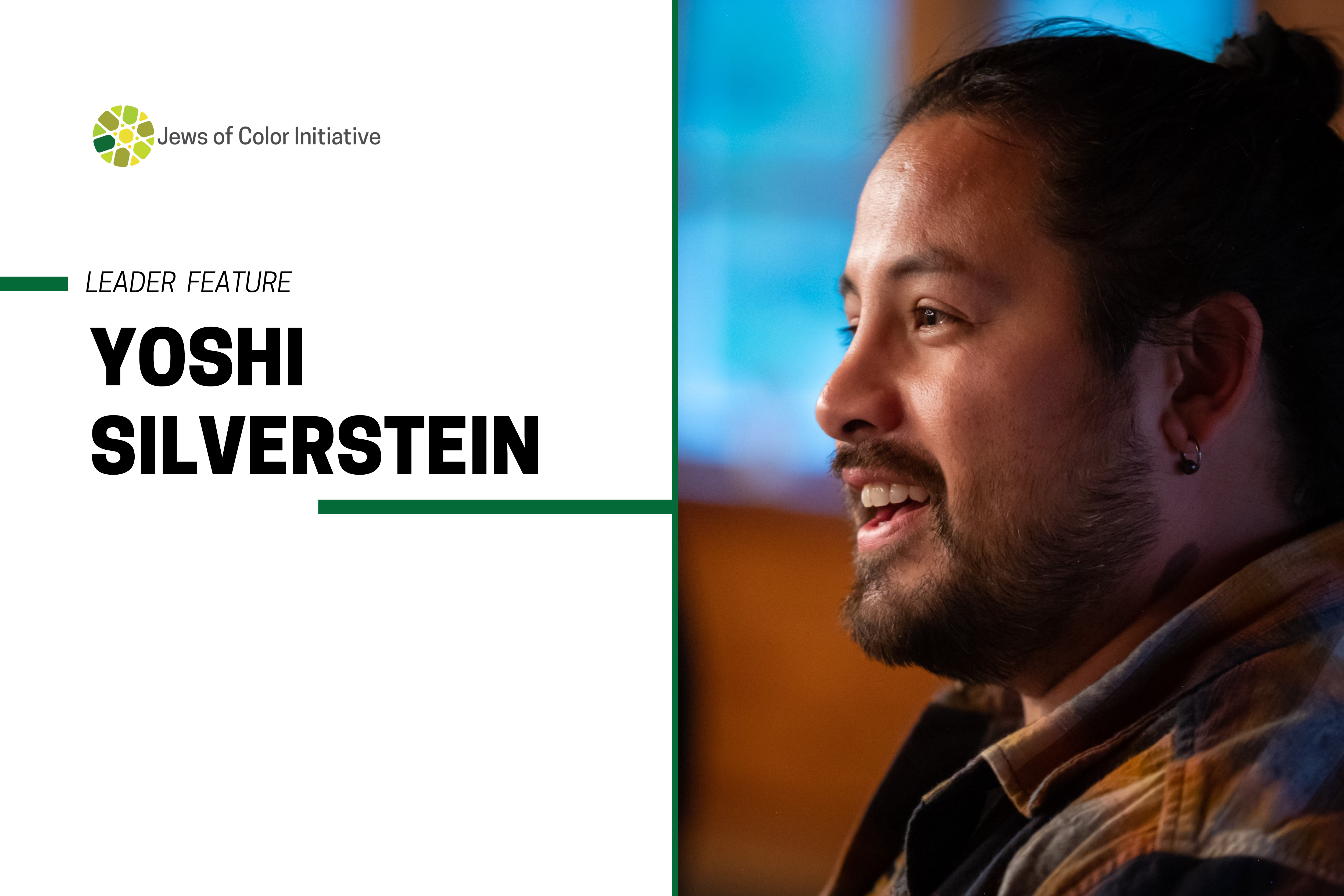
This year, each installment of the Galim newsletter will feature one individual whose work and activism significantly impact the Jews of Color field and, perhaps, inspire others to do the same. These features will also show how programs and supports within the Jewish organizational ecosystem helped to enable the individual to have the impact they do today. The JoCI is extremely excited to begin the new year by featuring Yoshi Silverstein, whose rich experiences in the Jewish communal ecosystem have helped him become an effective and thoughtful leader.
Silverstein founded Mitsui Collective, a community-based organization which helps people to fully embody their values through whole-body Jewish learning and practice, with a particular focus on somatic approaches to building antiracist communities and culture. Joyful movement, breathwork, music, and nature connection are just some of the tools Mitsui Collective employs in its workshops and engagements. By establishing a mind-body-soul connection in the struggle against institutional racism, Silverstein and Mitsui Collective represent an exciting new methodology in the fight against racism, and in the JoC field at large.
Growing up, Silverstein knew that in order to make an impact in the Jewish institutional ecosystem he, in large part, had to make his own way through it. His mother is Chinese, and a Jew by Choice, and his father grew up Eastern European Ashkenazi, but hadn’t really participated in Jewish life beyond his bar mitzvah. “As a kid and then teenager, there wasn’t as much Jewish knowledge or cultural immersion [in my family] as others with deeper roots” Silverstein explained. “While my parents were committed to raising a Jewish family, we didn’t have the sort of institutional knowledge or memory that other more established families and communities may have. I’ve been lucky to find all these different fellowships and learning opportunities, but by and large, I’ve had to figure all that out on my own.”
An early experience that made him a lifelong champion of Jewish communal education took place in the Hebrew school program at Silverstein’s childhood synagogue in Spokane, WA — where, he emphasizes, his parents are now both pillars of the community; his father is current Temple president, and his mother has served two separate terms as well. With the encouragement of his Rabbi and Hebrew school teacher, Silverstein discovered his innate skill and fascination with Jewish liturgy and learning. Silverstein then further deepened both his learning and leadership through a range of cohort-based programs in the Jewish community, such as a high school leadership seminar with USY (United Synagogue Youth), and the Cornerstone Fellowship with Foundation for Jewish Camp.
“There’s something extremely powerful about peer-to-peer cohort-based learning, which really shapes and frames the learning in a unique way” said Silverstein. “I think that’s a metaphor for all Judaism. And that’s part of our core pedagogy at Mitsui Collective — to learn in chevruta, in deep relationship with other people. Sometimes that’s with text. Sometimes it’s with a tennis ball, or a staff, or in nature. There’s something deeply Jewish about being in a community of practice, which is really what cohort-based learning is all about.”
Silverstein believes he is not alone as a Jew of Color in having to forge one’s own path through Jewish institutions. It wasn’t until he joined an all-JoC cohort of Bend the Arc’s Selah Leadership Program that the powerful potential of building solidarity and belonging with other Jews of Color became clear to him. “I hadn’t realized that in all these other Jewish spaces, I hadn’t been able to bring my full self. All these ways of being Jewish that I had seen [until then] were very subtly missing something, and I didn’t even realize it… Selah helped me bring together all these aspects of my identity and experience that I thought had nothing to do with being Jewish.” He recalled a profound memory of performing a martial arts kata during a talent show in front of his JoC co-fellows. “Looking back, there is actually a clear line between Selah and the work I do at Mitsui Collective, which is all about bringing together embodied learning and somatic experience into Jewish leadership and community building.”
“The power of fully embodying JoC experience is made possible only when JoC are able to congregate and learn from one another’s experiences,” said Silverstein. This means that we must continue to forge a future where all racialized identities can fully embody their Jewishness—to achieve a state of radical belonging where being JoC is “part of how you move and exist in the world… something you don’t even have to think about, because it is so deeply a part of what you are.”
This is by no means a straightforward task. In his time as a Jewish leader, Silverstein’s position in the landscape has revealed to him the complex internal dynamics that arise in JoC spaces, especially as increasing attention is paid to the lack of diversity in the Jewish communal ecosystem. Simultaneously, exciting partnerships and communities are formed as JoC connect with and learn from one another. Silverstein compares this uniquely JoC path of self-discovery leading into community building to the experience of practicing music first alone, and then with a group. “At first, you’re just practicing something in isolation,” he said. “Maybe just a simple chord progression. But then suddenly, you’re playing some music together. And you find these moments of incredible synergy where it all comes together. And you’re like, look at that. I just did it. It was in my fingers. It was in my body and I didn’t have to think about it, it was just there.”


